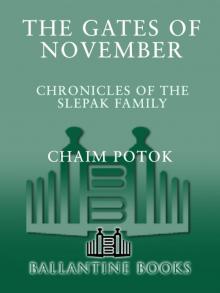- Home
- Chaim Potok
I Am the Clay Page 5
I Am the Clay Read online
Page 5
The soup had a strange but not unpleasant flavor. Rice chaff? Pine nuts? And there seemed to be some kind of meat floating in it; he chewed it down greedily.
Another shadow appeared and stood beside the woman. This shadow too had a face, that of an old man: brown wrinkled features; dark angry eyes; wisps of graying beard on his upper lip and chin; a long-stemmed pipe held between clenched teeth. His body small, thin, wiry, even in the wadded coat. A small ugly old man, head covered by a cap with ear flaps. A large mole on his left cheek.
The boy drew back from this shadow. It had about it the dark radiance of the evil snake, the dragon, in the pond beyond his village: moist, cold, reeking, and merciless to little children fishing alone on the pond’s edge. Never never fish there alone, Mother had repeatedly warned. He fished there often and had sneaked away in his special jacket from a family celebration and had been there alone fishing through a hole in the ice the day the soldiers from the North came. He slid behind the trees and lay very still and small, listening to the gunfire and the screams. He thought he saw the dragon in the water, swimming slowly back and forth, its huge form a dark shadow beneath the ice. This old man an evil dragon. This old wrinkled angry evil dragon who had earlier in the day shouted, “Nothing but the knife for soldiers like that!” The boy handed the empty bowl to the woman and slid beneath the quilts until they covered his face and head. Small, small. If the evil dragons don’t see you they go away. Good dragon, help me. Small. Like a bird in flight. Like a butterfly. Like a grain of rice. Small.
The old man had set up the pieces of scrap metal that had been their shelter on the riverbank and they slept that night in a field somewhere between the city and the sea. He woke during the night to put the last of the brushwood on the fire and saw parts of the city burning, long flames flickering red upon the low clouds. A cold wind rose from the fields and blew past him with soft moans. Scattered fires dotted the darkness, revealing dim squatting figures. He took comfort in their presence. Stay with people, the carpenter had warned. Where were they now, the carpenter and his wife and sons? Along the road vehicles moved like shadows toward the sea, only their night lights visible: the slitted eyes of evil spirits. The sounds of war distinct. What will we eat tomorrow? The boy eats for two. Suddenly stubborn as a pony, this woman. The boy will bring trouble, I feel it. Shadowy forms—starved dogs?—flitted along the perimeter of dim yellowish light cast by the flames. He called out a warning. There was a brief skittering, and silence.
His legs and back aching from the burden he had borne much of the day, he returned to the shack and slipped beneath the quilts. Between him and the woman lay the boy, breathing softly. He is nothing to me. A stranger from another village and clan. Whose son? A landowner’s? A scholar’s? Let them care for their own. He takes my food and my strength. How the woman clings to him. What devil pushed us into that ditch with this boy?
From the dark road came the clatter of tanks. The frozen earth trembled. After a while the old man fell asleep.
All the next morning they walked toward the sea through fields and paddies that inclined gently downward toward an increasingly wide and vacant horizon. The old man and woman pulled the cart together. Once the boy poked his head out of the quilts and saw a vast gray sky untouched by mountains and an expanse of frozen fields across which straggled masses of refugees. The immensity of the sky awed him. He smelled the brine-scented air. Incense to appease the spirits of the water? He watched the old man pulling at one of the shafts of the cart. He does not want me with them. He will send me away. Trembling, he slid back under the quilts.
Toward afternoon the woman caught a glimpse of the sea: an enormous sheet of dull-shining metal shading off into a blurred and fragile horizon. The unbounded watery expanse frightened her. Mountains and hills offered a contained and comforting world, a sense of solid place; this endless space brought dizziness and a sense of dislocation. Here the earth comes to an end. If we are not careful we will fall off into nothingness or into an underwater cavern of ghosts and demons. How will I protect the boy?
The old man too had never before seen the sea. He thought it a hundred rivers set side by side across which the spirits sent angry winds. He saw mudflats up ahead, a barren landscape descending to the sea. The scattered line of scrub brush and trees ended at the mudflats. The old man slipped the A-frame over his shoulders and went off toward a clump of brush where others were gathering wood. Taking hold of both shafts of the cart, the woman went on alone.
Later they entered a city by the sea and together with hundreds of others encamped in early twilight near a stone jetty that extended far into the water. Putting up the sides of the shack, the old man watched as the woman carried the boy to the edge of the jetty and set him down so he could with her support relieve himself. How tenderly she held him, the quilt over his shoulders. Building a fire, he saw her talking to the boy, observed the gentle movements of her hands as she helped him urinate into the lapping waves. He felt again a rising of anger. This stranger, this stealer of food and loyalty.
The sea was murmurous in its rise and fall. Gray and dark and fringed with foaming muddy water. Waves washed across the desolate shore. The horizon, blurred by clouds and the coming evening, grew more and more indistinct, and the sea seemed to be expanding without end, while behind him the houses of the city, veiled by the dusk, were beginning to disappear. The vast and endless plain of evening. He stood at the edge of the sea and listened to the darkness and imagined the waters, driven by a sudden gusting wind, rising and washing over them all: advancing like a wall and crashing down upon them and sweeping them back out into that world of water, that engulfing emptiness. Yet so many lived here. An entire city. But deserted now. Only soldiers moving in and out of the buildings and along the bridges and roads. Earlier two South Korean soldiers had emerged from behind some trees, carrying rifles.
The old man had felt their rude hands on him. He looked away as the soldiers turned to the woman.
“What’s in the cart?” one of the soldiers asked.
The woman answered quickly, “Things we took from our village. Quilts, mats, pots. And this and this and that.”
“What’s under the sleeping bag?”
After the briefest of hesitations, “A boy.”
“What do you mean, a boy?”
“Our son,” the old man heard her say.
“Pull down the sleeping bag, old mother. Very slowly.”
The old man kept his head turned away.
“What’s wrong with him?” the first soldier said.
“A terrible wound in the chest.”
“He stinks like a shit bucket.”
“Hey, Uncle, you got any money?” the second soldier asked.
The old man turned to him but did not respond.
“Hey, you hear me, Uncle? You got any money?”
“No money, no money,” the old man said.
“I’ll break your head if I search the cart and find money.”
“No money, no food. Only this for food.” He held up the tiny field animal he had found half dead in a clump of brush and saw the soldiers looking at him and then at each other, astonishment and disgust on their faces. They had motioned him forward and he and the woman dragged the cart past them and walked without a word through the darkening seaside city to the mudflats near the jetty.
Here the water was not frozen. Here it kept sighing all through the night and moving like a restless spirit back and forth across the cold wet shore.
Bursts of automatic-weapon fire woke them in the early dawn light.
The old man leaped from the quilts into a wall of freezing air and ran to the cart, ignoring the pain in his muscles and bones. The woman scooped up the boy and the quilts. All up and down the mudflats were the sounds of firing and pandemonium.
Soldiers came running across the mudflats shouting and firing their weapons into the air.
The old man started to load the metal pieces of the shack onto the cart.
A sold
ier ran over to him. “You get out of here now, Uncle.”
The old man pointed to the partially dismantled shack, his hands making the motions of pleading.
“You move, Uncle! Move! Americans are exploding the city!”
The woman took up the shafts of the cart.
They fled across the mudflats, the pale-gray dawn sea to their right, and went along a stretch of sandy soil and then through scattered brush and more mudflats. From behind them came a low rumbling noise that grew into a heart-numbing roar and they turned and saw the entire city erupting in smoke and flame. Huge tongues of fire leaped into the air, followed by boiling clouds of dust and debris. A vast dirty brown-red cloud began forming over the city. The old man and the woman felt the ground trembling; dense waves of air struck at them and sucked breath from their lungs. The boy brought his head out from beneath the quilts and stared at the city and the old man saw upon his thin face a look of horror. Then he was emerging from the quilts and scrambling from the cart. Names and words poured from him. The old man heard “pond” and “fishing” and “dragon” and “soldiers” and “village burning.” The boy ran staggering through the icy dawn, away from the destroyed city. He stumbled and fell and rose and fell again and the woman ran to him with a quilt and covered him and brought him back to the cart, murmuring to him softly, and the old man took up the shafts of the cart and walked on, the woman now alongside the cart, soothing the boy, who lay trembling beneath the quilts.
All that day they walked southward and the city could be seen burning, dusty clouds churning over it like a horde of raging spirits.
Toward evening the boy was feverish again.
Fearful, the woman put her left hand on his face and with her right hand made vertical and horizontal motions over his head. Spirit of Grandfather, protect him. Spirit of my tree, protect him.
The old man stood gazing at the boy. This burning is not from the wound. The wound is healing; its edges are sealed. Soon the woman will have to remove the threads.
From what is this burning? Perhaps from the demons of memory. They attach themselves to a person and that person wastes away. He had seen that happen before in the village. The old carpenter’s brother, who lost a son one year to the flooding river: the demons of memory had eaten him to a shadow before the eyes of the entire village.
The old man found himself thinking that perhaps this time the boy would really die.
He wondered then why he wanted the boy to die. The woman would not abandon the boy. And the boy, because he was hurt and alone, would not leave on his own. But he would certainly leave later to return to his village. What if his village no longer existed? Then he would return to his family and clan. But what if all were destroyed, as had happened to so many? Then they would give him over to the government or to an orphanage. But what if the woman refused and the boy chose not to leave? Still, why should he want the boy to die? A helpless child.
The old man then found himself gazing at something within him that he had never before seen. All knew of the unseen world beyond the everyday realm of appearances; but he had never thought there might be such a world inside himself: unexplored and cavernous. And because he could neither understand nor name it, he could not see which spirit or demon lurked within it, and that was for him the greatest fear and bewilderment of all.
Still, he was certain he wanted the boy to die.
They slept on the ground near a stand of shattered trees. Dead branches littered the shell-pocked earth but soldiers had come earlier among the refugees and warned against making fires. The woman could not sleep for the cold. All around were footsteps and moans and the sibilant whispers of the spirits of the trees. She lay beneath the quilts and sleeping bag alongside the boy and heard clearly the talking of the trees: the anger of spirits not properly fed, the vengeance they planned—this one’s child would drown in a pond; another would burn of fever; a third would topple headlong from her swing … Up and down on the swing, the warm spring wind on her face; higher and higher, until her bare feet sent the peach blossoms raining down upon her, and higher still, to the very heaven above. White anemones glistened on the slopes of the hills and frogs had begun to bring their music to the nearby streams. Up and down and higher still, embraced by the kind spirit of the tree. The boy lay beside her, very still … Mother came running that day with news of my marriage: our names and birth days were in accord; men would soon arrive from the bridegroom with gifts of cotton and silk and fine shoes. The boy lay rigid and strangely still. Perhaps he will die after all. What do the spirits care about how many children they take from one mother? Did they not take three from the wife of the old carpenter? Up and down and higher and higher a terror this creature beside me and where will I run they are all dead their hands tied behind them in their shallow grave and why is she singing, this old woman. She felt the boy suddenly stirring, was stabbed by his moan. Raising her stiff arms, she felt upon her face the dry coarse flesh and broken nails of her hands, then drew across the underside of the quilt the vertical and horizontal signs taught her by her mother and murmured soothing words to the boy. The old man slept on, breathing deeply. Stiffening, the boy cried out. Hands tied behind their backs and earth on their faces. Grandfather and Mother and Father and and and earth in their open mouths and eyes and their heads in odd positions as if without bones and and and running. Who are these two old people and demons of fire on my eyes and what is this old woman doing now singing. Mother would sing with earth in her mouth and there are fiends in these broken trees I hear them and they will kill the boy this night. But she swung on the swing higher and higher and when she could go no farther, at the very height of the arc, at that instant of hesitation between up and down, she leaped from the swing toward the trunk of the nearest shattered tree, arms and legs swimming through the air, and entered deep into the core of the tree, and in the depths of the tree she encountered the clammy foul-smelling spirit, clung to it, sank her fingers into its hooded eyes, heard its piercing scream, felt its tail lash her legs and grasp her thighs. A stone-shaped cry stuck in her throat. The pain! She clutched the scaly throat, pressing upon it all her weight, and the creature, writhing, released its grip and slithered from her with tiny moans of defeat and vanished into the heart and root of the tree; and the old woman lay very still, a heavy throbbing in her chest and thigh. She mounted the swing and flew up and higher and took with her the pain of the boy to the blossoms on the boughs and to the heaven beyond. She slept then in a delirium of hunger and dread and through the occasional bursts of automatic-weapon fire that stitched the distant fringes of the refugee camp.
The old man heard movement, a moan of pain. A burst of light, iridescent sparks rising. The lights were inside his eyes. He thought he must be dying. Death welcome. But to be buried in this desolation. Or not to be buried at all.
That last thought brought him sharply awake. His lids scraped across swollen eyes.
He saw the woman with her head over the boy’s exposed chest. She had brought her mouth down upon the boy and was gnawing on one of the black stitches.
The boy gave out a little scream and pushed with his sticklike arms against the woman’s head. She moved her head slightly away and with her fingers tugged at the stitch, which she then pulled through the puckered skin of the healed wound.
The boy watched in horror.
The scar, about two inches in length and parallel to the right collarbone, was red and ugly. Again and again she put her mouth to the wound and each time chewed at length, making dry grinding noises with her teeth. The boy felt her wet lips and tongue upon his chest, smelled her breath. She drew the stitches through and held them dangling in her fingers, black writhing strings, and threw them clear of the quilts.
She was done. Her mouth ached. She tasted the blood from the broken gums around her teeth. Covering the boy’s chest, she murmured to him soothingly; and the boy lay still.
The old man looked at them in the dawn light that filtered through the partially open top of the
sleeping bag and knew the boy would not die of the wound though they would probably all die of the hunger that would soon finally and firmly settle upon their lives.
Many already lay dead on the beach. They lay where they had died in their sleep and no one moved them after the removal of their shoes and clothes. The woman, trembling with weakness, shook the vermin from the quilts and sleeping bag. The bugs scattered on the sand; the lice she would attack again later.
Carrying the quilts to the cart, she suddenly grunted and bent over, and stumbled off behind some trees.
The boy stood a moment, glancing around, shivering.
The old man felt the boy’s eyes upon him. He helped the boy into the cart and wrapped him in quilts.
Knowing now the boy would not die of the wound, the old man thought to study him closely and saw, in the folds of the quilts, a frightened trembling creature with dark hair, a furrowed brow, dark soft eyes arched with fear, a slender nose, the center of the mouth bow-shaped and then dropping to thin pale lips, a soft rounded chin, high-boned cheeks, and a long thin neck. His lips were parched and cracked. There were reddish sores on his face.
The old man looked away from the boy, shivering with uncomprehending anger at the spirits that had sent him to them. Why did they return his life to him? Is he strong with magic?
“Are you able to speak?”
Hesitantly the boy nodded. He means to hurt me.
“What is your name?”
“Kim Sin Gyu.”
“Where are you from?”
The boy named a place north of the old man’s village, a slight breathlessness in his high thin voice.
“What is your father?”
“My father?” A lengthy pause as the boy looked away and then looked back. “A scholar. A poet.”
“Where are your people?”
This time the boy did not respond.
“What happened to your people?”
Still the boy said nothing.
“You have no one?”

 The Gift of Asher Lev
The Gift of Asher Lev The Gates of November
The Gates of November In the Beginning
In the Beginning Davita's Harp
Davita's Harp I Am the Clay
I Am the Clay The Promise
The Promise The Chosen
The Chosen Old Men at Midnight
Old Men at Midnight My Name Is Asher Lev
My Name Is Asher Lev